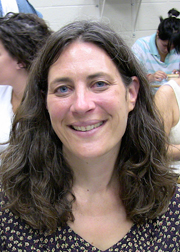In the midst of preparing for the annual Cortaca Jug, Ithaca College will challenge 86 national colleges and universities in a competition to collect the most game day garbage and waste.
The college will compete against universities like Harvard, Yale and Syracuse in the Game Day Challenge, a contest sponsored by the Environmental Protection Agency, which strives to increase recycling and composting on campuses around the nation. The EPA will rank the schools depending on their recycling and waste data.

This is the first year Ithaca College is participating. The idea to sign up came from professor Paula Turkon, who assigned the event to her Principles and Practices of Sustainability class as a group project.
The main goal of the Game Day Challenge is to build a strategy that other organizations can use at their events, Turkon said.
Turkon said her students will wear fluorescent green T-shirts and encourage spectators at the game to dispose of their waste properly. Students will also target the tailgating area and hand out color-coded trash bags — one for recycling and one for composting.
“We are hopefully going to be enough of a presence to help people put things in the right place,” Turkon said.
Mark Darling, sustainability programs coordinator, said the Game Day Challenge derives from a previous program, Recyclemania!, which the college has participated in for five years. Unlike the Recyclemania! project, Game Day Challenge aims to reduce waste and increase recycling specifically in sports games and other events.
Turkon said though the college should be shooting for a score of zero waste, she said she admits it will be difficult to achieve those results considering it is the first time the college will participate.
Four weeks ago, Turkon’s class attended the Bombers’ game against Hartwick College to get a sense of the amount of waste they would be up against Oct. 30. The class noticed that most of what was sold at the concession stand during the game is recyclable, which increases the probability of getting a low score, Turkon said.
Darling said at this point the college should be expecting at least 50 to 65 percent of the waste to be collected.
“I’m pretty sure half of what is out there can be streamed in the right direction,” he said.
The college is also participating in another program established earlier this year. Marian Brown, special assistant to the provost, organized a Cortaca Climate Challenge to “lighten the environmental and carbon footprint” of the event. She said the challenge is intended to harness the rivalry between the college and SUNY-Cortland in a more productive way.
Brown said she has seen a tremendous increase in student involvement in environmental issues in the 30 years she has been at the college.
Senior Cody Norton, who is taking professor Turkon’s course, said though the Game Day Challenge was originally only a class project, he believes it is an idea that could be implemented in future years.
“It shouldn’t just stop with one game because that is not really the point of sustainability,” he said. “[The point] is to have an enduring change that lasts a lifetime,” he said.







